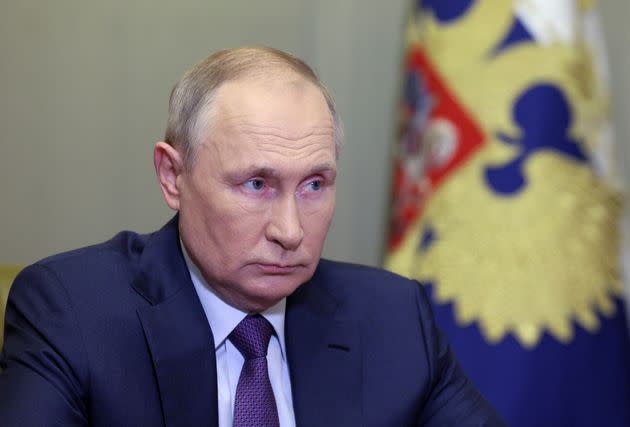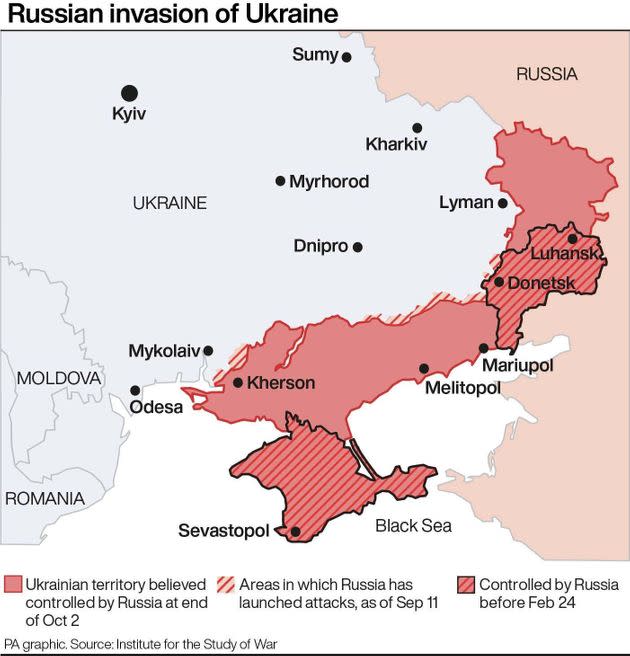Putin's Situation Is Becoming 'Desperate', UK Intelligence Claims After Violent Strikes

Russian President Vladimir Putin is in a "desperate" situation according to UK intelligence (Photo: GAVRIIL GRIGOROV via Getty Images)
Despite the horrific air strikes targeting Ukraine this week, Russia is struggling with a “staggering” amount of losses, according to UK intelligence.
Moscow launched around 83 missiles to hit cities across Ukraine on Monday and Tuesday, after blaming its neighbour for destroying a bridge of strategic importance between Crimea and Russia.
Ukraine had not actually taken responsibility for this, but the Kremlin still blamed it.
The attacks followed the astounding success of Ukraine’s counteroffensive, where troops reclaimed huge amounts of land in the east and the south of the country.
Although the air strikes, seen as a display of Moscow’s power, shook Ukraine and the international community, here’s why UK officials still believe things are not going well for Russia.
Strategic errors and staggering costs
Sir Jeremy Fleming, the head of GCHQ, will use a public speech today to say Ukraine is “turning the tide” in the ongoing war, both on the frontline and online.
Speaking at the Royal United Services Institute (RUSI) in London, Fleming is expected to say Russian president Vladimir Putin’s decision making has been “flawed” ever since he failed to seize the capital Kyiv back in February.
“It’s a high-stakes strategy that is leading to strategic errors in judgement.”
He will also point out that all of Russia’s attempts to infiltrate Ukraine over seven months have been undone in just a matter of weeks.
“Their gains are being reversed. The costs to Russia – in people and equipment are staggering.
“We know – and Russian commanders on the ground know – that their supplies and munitions are running out.
“Russia’s forces are exhausted.”
Fleming will also note that the partial mobilisation of Russian reserves (announced in September) will not necessarily strengthen its armed forces.
“The use of prisoners to reinforce and now the mobilisation of tens of thousands of inexperienced conscripts, speaks of a desperate situation.”
Fleming will reference the mass exodus of Russians leaving their home country to escape being drafted into the war effort, too. He will point out that civilians will know they can no longer travel, will have restricted access to modern technology and external influences.
“And they are feeling the extent of the dreadful human cost of his [Putin’s] war of choice,” he is expected to explain.

Russian invasion of Ukraine. See story UKRAINE Russia. Infographic PA Graphics. An editable version of this graphic is available if required. Please contact graphics@pamediagroup.com. (Photo: PA Graphics via PA Graphics/Press Association Images)
Messy chain of command
The Ministry of Defence shared a similar take on Russia’s success in its daily Twitter update on the war – although it pinpointed another reason for its struggles.
It explained: “For much of its operation, Russia has likely lacked a single empowered field commander.”
The MoD added that a previous general (Alexandr Dvornikov) is believed to have held the top role between April and August this year, but “it is unclear whether he was able to effectively exercise control over the often disparate and competing groups of forces”.
The newly-appointed general, Sergei Surovikin, is seen as an increased effort from “the Russian national security community to improve the delivery of the operation”.
The MoD continued: “He will have to contest with an increasingly factional Russian MoD which is poorly resources to achieve the political objectives it has been set in Ukraine.”
But, the war is still far from over
Putin is clearly upping his aggression as his efforts on the frontline flounder, meaning the Ukrainian public are likely to suffer.
The UN believes a total of 6,221 Ukrainian civilians have already been killed since Putin invaded in February, and 9,371 injured.
And there are Putin’s ongoing nuclear threats hanging over the war, even though few pundits believe he will actually go ahead with it.
Fleming is also set to warn his audience that the Chinese Communist Party is”learning the lessons” from the Russia’s war in Ukraine.
He will point out that China, after seeing how Moscow has been impacted by Western sanctions since invading Ukraine, could try to protect itself from any similar backlash.
Beijing is believed to be considering a potential invasion of its neighbour Taiwan.
Fleming will claim Beijing could use digital currencies to track transactions, and to protect its economy from the sanctions Moscow is currently facing.
This article originally appeared on HuffPost UK and has been updated.

 Yahoo News
Yahoo News 